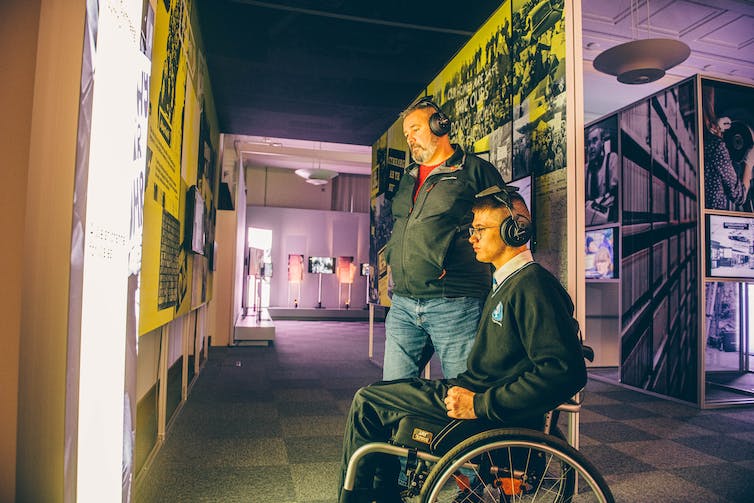Hundreds of hundreds of hours of broadcasting historical past can be found for the primary time. National Library of Wales
This month’s launch of the Wales Broadcast Archive marks a significant step ahead within the curation of our collective audiovisual heritage. Housed on the National Library of Wales in Aberystwyth, the archive incorporates a cornucopia of fabric courting again to the early days of broadcasting in Wales, together with movie, radio and video. That it’s the first of its variety within the UK, nevertheless, raises essential questions on entry to our audiovisual historical past.
As Unesco remarked on the World Day for Audiovisual Heritage final October:
Audiovisual archives inform us tales about individuals’s lives and cultures from everywhere in the world. They characterize a priceless heritage which is an affirmation of our collective reminiscence and a precious supply of data, since they mirror the cultural, social and linguistic range of our communities.
More usually than not, entry to broadcast archives has been restricted to these working inside the trade or tutorial researchers. Last 12 months, although, the BBC opened up a part of its digitised archive on-line, permitting the general public to entry a few of its hidden gems.
However, the brand new Wales archive is exclusive in that it brings collectively the archives of its three main broadcasters – BBC, ITV and S4C. It incorporates materials reflecting all features of life in each the English and Welsh languages. It is a novel supply of data which is able to give historians and others an perception into the historical past of the nation.
As effectively as preserving our broadcast heritage in its unique and digitised kind in Aberystwyth, individuals round Wales will be capable to entry round 500,000 hours of archive footage in devoted “clip centres” housed throughout the nation. For the primary time, members of the general public will be capable to see historic footage of their native areas and listen to voices from years passed by.
Although the Wales Broadcast Archive is exclusive inside the UK, there are related establishments additional afield. One such organisation is the Netherlands Institute for Sound and Vision, Beeld en Geluid, which opened in 1997. It offered a helpful mannequin for the institution of the Welsh archive. As a heritage institute, it preserves the audiovisual materials of the Netherlands, with materials from the nation’s numerous broadcasters below one roof.
Technology and storage challenges
Of course, archives are usually not with out their issues or their gaps. Very early tv programmes, for instance, at the moment are misplaced perpetually. The know-how merely didn’t exist to report within the pre-war and instant post-war interval. Nothing survives from the BBC’s pre-war tv service at Alexandra Palace – aside, that’s, from some fascinating movie shot on a house film digital camera by one of many company’s engineers, Desmond Campbell, which is held by the Alexandra Palace Television Society.
As Dick Fiddy, a marketing consultant on the British Film Institute, famous:
The early technical difficulties related to the recording of dwell tv programmes, and the later injudicious wiping and junking insurance policies of the foremost British broadcasters, has meant that a whole bunch of hundreds of hours of valuable tv materials is lacking from the official UK tv archives.
Over the years, many broadcasters have needed to dispense with their audiovisual materials merely for storage causes. Film and videotape can take up a variety of flooring area, not to mention audio recordings. When one considers the large quantity of broadcasting hours which can be chewed up each week, it’s simple to see how bodily materials can mount up over time.
So, broadcasters have needed to undertake choice insurance policies, making choices on what materials or programmes may be traditionally essential sooner or later. As you may think about, this has not been a simple process. Often, leisure programmes reminiscent of quiz exhibits, selection or native chat exhibits had been deemed to haven’t any intrinsic worth and had been missed for archival functions.
Archivists are additionally confronted with an ongoing dilemma. They must be preserving materials for future generations whereas additionally guaranteeing that the producers of present programmes have the required audiovisual archives at their disposal.

The public may also entry the brand new archive in devoted ‘clip centres’ all through Wales.
National Library of Wales
The query now could be whether or not the opposite UK nations ought to observe go well with. While the same mannequin might be adopted in Scotland, in England the difficulty of whether or not the archives ought to home an English or British archive would must be overcome.
Our collective audiovisual heritage supplies a key to understanding ourselves as a society. It supplies a further entry route into our previous which enhances that offered by the written report.
After all, archives are witnesses to historical past. They permit us to see how we lived, how we dressed, how we talked, how we had been entertained, and the way and after we watched or listened collectively. They additionally permit us to mirror and to be taught. The Wales Broadcast Archive will do that and I, for one, am celebrating its arrival.
![]()
Jamie Medhurst has acquired funding from the AHRC, The Leverhulme Trust, and the British Academy up to now
